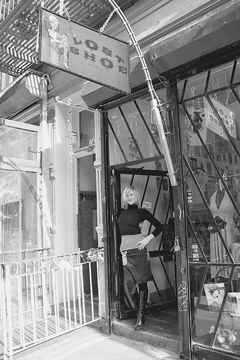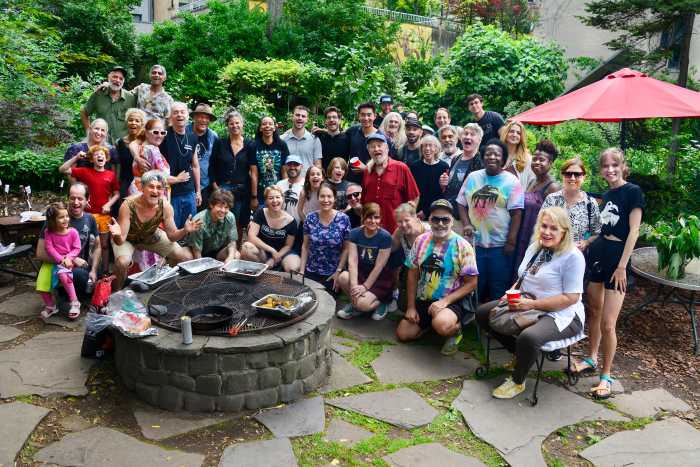By Ronda Kaysen
Anne Hanavan arrived at her Lower East Side shop in a leopard-print shirt, tight jeans and a bad mood. “Look,” she said, tugging open the steel gate, “If all you want is a story about a prostitute, I’m not interested. Go talk to someone else, there are plenty of former prostitutes around here.”
The real story, she said, was her shop, a tiny clothing and novelty store on Ludlow St. called Lost Shoe Productions, and her burgeoning film and fashion career. Hanavan, a striking woman standing 5 foot 8 inches (before the heels) with straight blonde hair, heavy-lidded blue eyes and a hard, angular jaw, is not the kind of woman you’d want to challenge.
But remnants of her previous life as an East Village drug addict and prostitute are everywhere. Lost Shoe Productions — doused in pink and hot pink — sells, among other things, Valentine’s Day cards of cartoon go-go girls in cages and Fluffer panties in black boxes. Her films, avant-garde masturbatory shorts performed to punk rock, hark back to Hanavan’s years as a sex worker. And she jokingly describes her sense of style as “hooker couture.” With Hanavan, 39, there is no escaping the past.
Hanavan’s anger was short lived. Within moments, her charismatic, affable nature returned and she and I trotted down the street for a cup of coffee at a nearby cafe. Hanavan easily struck up a conversation with the barista, complimenting her on a new haircut and chatting with her about her boyfriend.
Hanavan is at home in her shop. A group of women breezed into the store while we spoke on a Friday afternoon. “Those f—-ing hoodies are sick!” she said, when one of them picked up a sweatshirt. Another one grabbed a pair of black capris. “You need to try them on. They’re gorgeous!”
As Hanavan and I settled into the shop’s plush sofa last Tuesday, a story of addiction and recovery began to unfold.
A Buffalo native, Hanavan moved to New York City at 18 for college at the Fashion Institute of Technology. Her father, head of the Health Sciences Department at Buffalo University, had died suddenly at the beginning of the summer, and Hanavan, already nursing the beginnings of a cocaine habit, got sidetracked.
Another girl in her dorm was dating Joey Ramone from the East Village punk band The Ramones. She and Hanavan became fast friends. At about the same time, Hanavan met Ron Kimbel, an aspiring writer with a serious heroin addiction. “Our lives quickly spun out of control,” she said.
Hanavan dropped out of school and moved in with Kimbel. She took a job at the Lizmar Lounge, a now-defunct bar on First Ave. that was at the center of the East Village punk scene. Circus of Power, Annie Sprinkle and Sea Monster all performed in the bar’s subterranean level and the members of the Psycho Sluts, a female punk band, worked there for a time. Hanavan was smitten.
“It was amazing,” she gushed. But she hated the owner and eventually the bar staff quit en masse.
Hanavan started working at the Pussycat Lounge, a strip club Downtown, as a bartender. But bartending led to dancing and dancing led her to her first trick. “I remember calling from a pay phone,” she said of responding to the first offer. “It was just so weird, the whole thing.” Other dancers helped her get more tricks, which became a regular way to feed her habit. Kimbel, more of a friend than a lover, didn’t object. “We were like best friends,” she said. “The drugs connected us…. It was a sad progression.”
For a while, life was manageable. Kimbel, a short-story writer, had a wide circle of artist friends. Hanavan and Kimbel, after being thrown out of a St. Mark’s Pl. apartment, moved into an apartment on 11th St. in Alphabet City that belonged to director Abel Ferrara’s production company. She found herself friends with the burgeoning director during the time he filmed his breakout movie, “Bad Lieutenant.” She befriended punk guitarist Johnny Thunders, the Beat authors Herbert Hunke and Gregory Corso and Roger Richards, who owned the Rare Book Room in the Village.
But Hanavan’s life started to come apart at the seams when Kimbel was sent to prison for a spate of robberies. “Ronny seemed to be some sort of safety zone. I didn’t know how to function without him.”
Kimbel had shielded her from the worst of the East Village drug scene. He had copped — bought drugs — for them, protecting her from the street culture. But with Kimbel gone, Hanavan was left to fend for herself. “There was this whole network of street people that I never had to deal with.”
Hanavan vanished into her addiction, adding cocaine and eventually crack to her list of drugs. “It was like I dropped off the face of the earth.” Rumors circulated that she had committed suicide. She progressed from finding tricks through the Pussycat to streetwalking on E. 12th St.
Streetwalking was a dangerous business. She was repeatedly arrested, kidnapped by a pimp, raped by tricks and beaten by a fellow prostitute. She worked the streets during a string of prostitute murders that rattled the neighborhood. “Girls were disappearing,” she said. “Girls I’d been living with were getting killed.” One girl she knew, Lydia, was killed. Her neighbor’s girlfriend was also killed. In a desperate attempt to stop the killings, the police stopped arresting the prostitutes and began reaching out to them for information. On June 28, 1993, Joel Rifkin, a gardener from Long Island, was arrested with a prostitute’s body in the back of his van. He confessed to murdering 17 prostitutes over four years.
Eight years as a junkie and prostitute on E. 12th St. and Allen St., “which was an even lower-budget stroll,” began to take a toll on Hanavan’s body. She was hospitalized for months at a time for a heart condition called bacterial endocarditis, a disease common to heroin users. “I just thought I was getting dope sick,” she said. The bacteria attacked her heart, lungs and knee. “It was disgusting. It would happen to me over and over again.” She awoke in the intensive-care unit one day, emerging from a medically induced coma. She was told if she didn’t quit heroin she would lose her leg. “Death was something that was familiar to me, but losing my leg? I was like, ‘Oh my God!’”
Hanavan stayed in the hospital for nearly two months and for the first time didn’t call friends to bring her drugs. Her mother, who over the years, had traced her phone calls, hunted her down and enrolled her in upscale treatment centers, didn’t visit her this time. When she was transferred to a treatment center in Queens, her knee became dangerously infected and she was transferred to another hospital for emergency surgery on her knee. She spent two more months in the hospital. After four months clean, Hanavan decided to stay that way.
She moved to Brooklyn and “found a community of people who were clean out there and really, really serious about being clean.” After a year of having kicked dope, she relapsed for six days, but cleaned up again and moved back to Manhattan, eventually moving into an apartment in the West Village. “It was very creative,” she said. “Everybody was very healthy.”
After 13 years of addiction, Hanavan pieced her life back together. She cleaned houses, walked dogs and eventually began bartending again. She took film classes at New York University, making “experimental self-portraits.”
Her films, two-minute shorts — starring only Hanavan — take issue with growing up Irish Catholic, sex work, addiction and punk rock. “Paranoid,” one of these shorts, is filmed to a Black Sabbath song of the same name and stars Hanavan filming herself naked, holding a crucifix and masturbating. The film, for all its blatant sexuality, is less erotic than it is disturbing, a haunting image of a woman exposed. “It’s all about me and me working through stuff,” she explained.
The University of Buffalo invited Hanavan to screen one of her films. Her mother, a retired Red Cross administrator, went. “I told her, ‘It’s explicit. There’s anal,’” she said. To Hanavan’s surprise, her mom loved it.
In 2002, her short “Fairies Wear Boots” was accepted into the Fruit Farm Film Festival near Portland, Ore. She screened her “I Love Jesus” at the Kiasma Museum of Contemporary Art in Helsinki, Finland, and at an experimental festival in Paris in 2004. In May, the Anthology Film Archives will screen “Paranoid.”
On Jan. 28, four days after we spoke, Hanavan celebrated her seventh anniversary of sobriety. “All I do is chew gum now,” she said, adding “obsessively.” Her boyfriend, a truck driver, her friends and family took her out to celebrate.
In April 2004, Hanavan took over her friend’s shop on Ludlow St. and opened Lost Shoe Productions. The name refers to a time during her addiction when she woke up on the street in the East Village, robbed and missing a shoe: “It was a defining moment.”
Owning a Lower East Side business has reconnected Hanavan with the art scene she once knew. Ashlee Simpson has visited the shop, as has Anna Paquin from “The Piano.” Janeane Garofalo owns a pair of Hanavan’s jeans. And last New Year’s Eve, Hanavan saw Abel Ferrara for the first time since she got straight. She is one of the Karen Black girls in Kembra Phaler’s rock show, “The Voluptuous Horror of Karen Black,” which will perform at the Deitch Gallery in Soho in February.
As for the fellow prostitutes, drug addicts and dealers who were once her kin, she has never seen them again. Except once. Walking past the St. Mark’s Hotel eight months ago, she noticed a woman she had lived with. “I saw it in her face and it was sad,” she recalled. “I said a little prayer for her. She didn’t even recognize me.” For the first during the interview, Hanavan began to weep. “I had been arrested with that girl. I had lived with that girl,” she said. “At the time, you think it’s the most intense relationship…. But it wasn’t really a friendship, it was a suicide pact.”
She paused for a moment, wiped the tear from her face, and shrugged. “I’m glad she didn’t recognize me, she probably would have asked me for money,” she said. And then Hanavan stood up and led me to her computer to show two of her short films.
Anne Hanavan in her Ludlow St. store, Lost Shoe Productions































